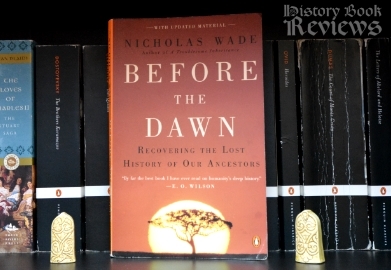Before the Dawn: Recovering the Lost History of Our Ancestors
by Nicholas Wade

Overview
- Author: Nicholas Wade
- Published: 2007
- Topics: Paleoanthropology, Evolution, Archaeology, Prehistory

Review
I was so excited to read Before the Dawn, with its promises of groundbreaking scientific and genetic discoveries that could unlock some of the secrets of human evolution and our distant past. However, as I started reading, it was not quite excitement I felt. In fact, it was something more like rage. Or at least intense irritation with a little bit of scorn in the mix.
The book is mostly a review of the course of human evolution from earlier forms of hominids to our present state. This includes discussions about the evolution of bipedalism, loss of body hair, monogamy, the transition from a hunter/gatherer lifestyle to one of agriculture, and the development of language. There was, disappointingly, very little evidence offered from genetic sciences (which was advertised as the main point of the book in its introduction), and the evidence he did present was grossly oversimplified and mostly outdated already. The rest of the book, the review of human evolution in general, offered little new information except for some highly questionable conclusions Wade himself drew. I am no expert in this field, but many of these conclusions seemed based on very slight evidence or just flaunted common sense, which makes me seriously question his credibility and accuracy.
Things that really annoyed me:1. Wade felt he had to consistently remind the reader that evolution is not a sentient being with an end goal in mind, and that contrary to what people (including scientists) have assumed, "human evolution did not halt in the distant past but has continued to the present day".
...No shit, Sherlock!!! I have a really hard time believing anyone assumes that, especially not scientists educated in the field.
2. Wade also mentions several times throughout the book that the ancestral people (meaning the early Homo sapiens circa 50,000 years ago) were so aggressive that it was impossible for them to live in settled communities, and that's why humans did not live in permanent settlements until later in our history when we lost our aggression. Not only is his evidence for this claim extremely slight, but he later contradicts himself by saying that people living in settled communities would have been under constant risk of attack. First of all, he offers no evidence for this. Who would have been constantly trying to attack them? He doesn't say. But if it were true, then doesn't that imply that humans were still freakishly aggressive after they started settling permanently, if there were such frequent rampages against each other? Gahhhh, the holes in logic here hurt my brain. And this is only one example of many.
3. For some reason Wade is strangely obsessed with Thomas Jefferson's secret slave family. He mentions it with barely contained, gleeful excitement many times. So many times.
4. This isn't Wade's fault, but many of the DNA discoveries he talks about are already out of date, and it makes it really hard to trust the information. I was bothered in particular by his treatment of Neanderthals, talking about them as aggressive, dumb brutes who exhibited no modern behavior such as language, culture, art, etc. Three years after this book came out the Neanderthal genome was decoded, and we now have a very different interpretation of Neanderthals, especially given that we now have proof that we interbred with them (If you want to read more about this, read Svante Paabo's Neanderthal Man, an account of the decoding of the Neanderthal genome by the geneticist himself). Like I said, it's not the author's fault, because this was the current state of research when Wade wrote his book. But it's really frustrating having to look up each study to check if it's been updated or disproved, as many of them have been in the years since Before the Dawn was written.
5. Wade really seems to denigrate the other branches of study such as archaeology, paleoanthropology, linguistics, etc. in order to promote the field of genetic science. I think the new field of DNA analysis is an amazing and exciting tool, but it must be used in tandem with the other social sciences in order to give us any real understanding of our ancient past. Genetics may be a novel approach to this research, but it is by no means the most important one (though as an archaeologist I may be biased).
Things I liked:1. Wade's writing style is very engaging, and it made me want to keep reading even though the content sometimes made me curse like a sailor. However, this could be a good basic introduction to someone new to the field of human evolution, or new to the concept of DNA analysis.
2. Wade included a chapter on the biology and genetic studies of race, and I found it very brave. He discusses this controversial topic neutrally and intelligently, and it impressed me.
Overall this book was easy to read but the author's expertise in the subject material was often in doubt. If you want a very basic and simplified introduction to the study of human evolution then this book will be very informative, although some parts will need to be taken with a grain of salt. But I would highly recommend a more scholarly book by an author who works more closely with the field. I can pretty much guarantee you won't find a single one who assumes that evolution stopped in the distant past.


